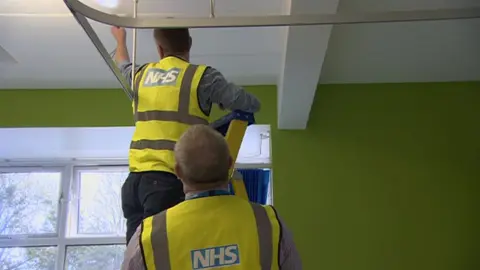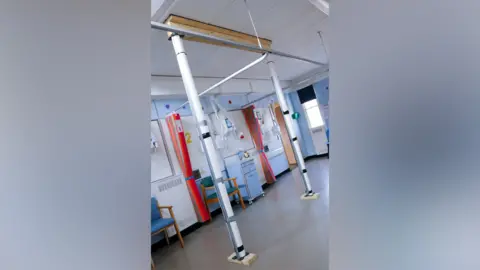Five hospitals at risk of collapse to be rebuilt
 BBC
BBCFive hospitals that are deemed at risk of collapse because of deteriorating concrete infrastructure are to be rebuilt, the government has announced.
The hospitals - Airedale in West Yorkshire, Queen Elizabeth King's Lynn in Norfolk, Hinchingbrooke in Cambridgeshire, Mid Cheshire Leighton and Surrey's Frimley Park - were all built using reinforced autoclaved aerated concrete.
The lightweight concrete was used in roofs, floors and walls between the 1960s and 1980s.
The material, which has bubbles inside like "a chocolate Aero bar", has a limited lifespan and all five are in urgent need of rebuilding.
At some sites roofs are having to be propped up with scaffolding and posts.
The sites have been added to the government's New Hospital Programme, which the government says will see 40 new hospitals built by 2030.
This though includes complete new-builds and sites undergoing major refurbishments and alterations.
A BBC investigation last week found work was yet to start on 33 of them.

The government also announced it would be spending more than £20 billion on the building programme.
Health Secretary Steve Barclay said: "These five hospitals are in pressing need of repair and are being prioritised so patients and staff can benefit from major new hospital buildings, equipped with the latest technology."
Another two hospitals - West Suffolk and James Paget in Norfolk - that have significant amounts of the lightweight concrete were already part of the hospital building programme.
Labour's Shadow Health Secretary Wes Streeting accused the government of over-promising and under-delivering. "It is not clear that the government has the money or the time to deliver 40 new hospitals by 2030.
"After 13 years of neglect, the NHS estate is crumbling. The Conservatives literally didn't fix the roof while the sun was shining and now patient safety is at risk. Their time is up," he said.
'Eye-watering cost'
Sir Julian Hartley, chief executive of NHS Providers, which represents hospitals, welcomed the announcement but said some trusts would be disappointed.
Eight schemes will now be completed later than originally planned, and after 2030, so these five new developments can be prioritised.
Sir Julian also said more than 90 other trusts had applied for funding but been rejected.
"The eye-watering cost of trying to patch up creaking infrastructure and out-of-date facilities is mounting, with a multi-billion-pound repairs backlog across the NHS growing at an alarming rate," he added.
